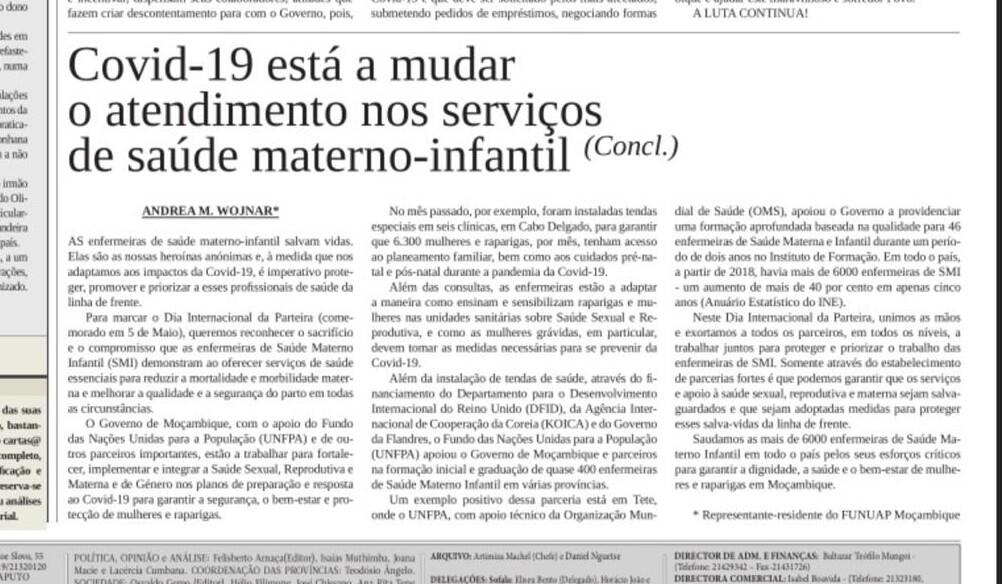This piece first appeared in Jornal Noticas to mark International Day of the Midwives.
COVID-19 is changing the field of midwifery
Opinion editorial
By: Andrea M. Wojnar, Resident Representative, UNFPA Mozambique
Maternal and child health nurses (often referred to as ‘midwives’) save lives. They are our unsung heroes, and as we adapt to the impacts of COVID-19, it is imperative that we protect, promote and prioritize these front-line health workers who are meeting the urgent sexual, reproductive, and maternal health needs of women and girls in Mozambique every single day.
To mark International Day of the Midwife, we want to recognize the sacrifice and commitment that maternal and child health (MCH) nurses demonstrate as they deliver health services that are critical to reducing maternal mortality and morbidity and improving the quality and safety of childbirth in all circumstances. Not only do MCH nurses save the lives of mothers and newborns, they also disseminate life-saving information and counsel girls, women and couples to make informed and healthy choices linked to their safety, health and well-being.
From Cyclones Idai and Kenneth in 2019 to COVID-19 in 2020, MCH nurses in Mozambique have had this past year to work in some of the most challenging and demanding environments to address health needs and support and manage pregnancy and delivery complications.
We recognize women like Adelaide Raul, who assisted three deliveries on the day Cyclone Idai hit Mozambique. "[The] most difficult [thing I experienced that day was having to support a woman during] childbirth because the room started to fill up with water," said the Mozambican who has been a nurse and midwife for 12 years.
MCH nurses like Adelaide not only support mothers through childbirth, but they also serve as inspiration for young mothers. One of the women who received Adelaide’s support expressed her gratitude, noting: “[these nurses] help us as if the childbirth was their own...she has helped me very, very much and I hope that I can help others as well as she helped me.”
Even in times of crisis, pregnancies and complications will occur, making it even more important for services to be in place to ensure a safe and healthy delivery. New analysis developed by UNFPA and partners shows that lockdown-related disruption due to COVID-19 over six months could leave 47 million women in low- and middle-income countries unable to use modern contraceptives, leading to a potential 7 million additional unintended pregnancies.
In Mozambique, based on a population of 2.5 million people who may need support as a result of the impacts of COVID-19, UNFPA estimates that some 17,000 pregnant women will deliver in health facilities over the next three months. Some 3,500 of all pregnant women (in and out of health facilities) as well as 4,700 newborns will experience complications, making the need for midwifery accessibility even greater. Conversely, through support and services largely provided by MCH nurses, 40 maternal deaths a month will be averted over that period of time.
The Government of Mozambique, together with the support of UNFPA and other key partners, is working to strengthen, implement and integrate gender and sexual, reproductive, and maternal health into COVID-19 preparedness and response plans to ensure the safety, well-being and protection of women and girls. Last month, for example, special tents were installed in six clinics in Cabo Delgado to ensure 6300 women and girls per month are able to access family planning as well as prenatal and post-natal care during the COVID-19 pandemic.
Despite the challenges imposed by COVID-19, we are inspired by the resilience and remarkable dedication demonstrated by these MCH nurses, particularly as they adapt to new ways of working and delivering care and support to girls, women and their newborns.
Innovation and technology are becoming pillars of work as, for the first time, hundreds of Mozambican MCH nurses are receiving training through online technology, ensuring they remain up-to-date on the latest protocols and measures. A further 6,000 health workers and MCH nurses will be trained through video using online learning platforms.
In addition to consultations, MCH nurses are adapting the way they teach and sensitize girls and women at health clinics about sexual and reproductive health, and how pregnant women, in particular, should take necessary measures to prevent COVID-19.
In addition to the installation of health tents, through funding from the United Kingdom Department for International Development (DFID), the Korea International Cooperation Agency (KOICA), and the Government of Flanders, the United Nations Population Fund (UNFPA) has supported the Government of Mozambique and partners to help build a better trained and supported midwifery workforce throughout the country by training nearly 400 MCH nurses across multiple provinces.
One positive example of this partnership is in Tete, where UNFPA, with technical support from WHO, supported the Government to provide in-depth, quality training for 46 maternal and child health nurses over a two-year period at the Training Institute. Nationwide, as of 2018, there were over 6,000 MCH nurses - an increase of more than 40% in just five years (INE Statistics Yearbook).
On this International Day of the Midwife, we join hands and call on all partners, across all levels, to work together to protect and prioritize the work of MCH nurses. It is only by forging strong partnerships that we can ensure that sexual, reproductive and maternal health services and support are safeguarded, and measures put in place to protect these frontline lifesavers.
We salute the 6,000+ MCH nurses across the country for your critical efforts to ensure the dignity, health and well-being of women and girls in Mozambique.


